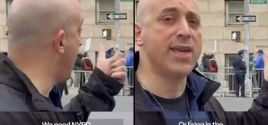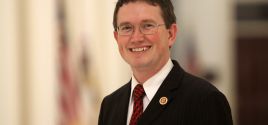There's just no escape from these snoopsHenry PorterThe Observer Dec. 05, 2006 |
Popular 
ADL Urged Congress to Pass FISA Law Spying on Americans to 'Protect Israel'

Rep. Thomas Massie Warns Congress is Trying to Pass Hate Speech Laws to Outlaw Criticism of Israel

'Sniper Seen on Roof Overlooking Pro-Palestine Protest' at Indiana University

Mike Johnson Pushes Debunked Lie That Israeli Babies Were 'Cooked in Ovens' On October 7

Claim Jewish Student Was 'Stabbed In The Eye' by Pro-Palestine Protester Draws Mockery After Video Released
 As a rural town installs official surveillance, in London they experiment with secret microphones on the street. Not a nightmare. Paranoid Britain today In Dawlish (for heaven's sake), where there are black swans, cream teas and an annual display by the Red Arrows, where a recent excitement involved the long-billed murrelet, a bird associated with the North Pacific which turned up just off Boat Cove... In Dawlish, Devon, they are about to install a £70,000 CCTV system to watch the town from day through dead of night. The posts are in, and when the weather permits cabling and cameras will follow. It's like placing CCTV in a poem by Thomas Hardy. It is absurd, incongruous, a symptom of the high old state we've got ourselves into over crime and security. There is very little crime in Dawlish. True, a burglary was reported in October and there is always the slight possibility of a serious crime taking place, as one PC Carter told a meeting of the town council: in the event of a murder being committed in Dawlish, the cameras would be equal to the task of identifying and locating the murderer. The town clerk, John Winchester, helped this doubtful - I hesitate to say dishonest - case for CCTV by saying that he was fearful when traversing a local park known as the Lawn. The council undertook a consultation exercise involving about 1,000 people - 800 residents and 200 tourists. Of these, less than 5 per cent actually mentioned the fear of crime and an even smaller percentage talked of CCTV cameras. But on the basis that cameras would allay fears - fears that had not found expression previously and we may reasonably conclude did not exist - the town council went ahead with the system, overriding planning laws and without seeking the consent of the landowner - Teignbridge District Council. One man, a retired writer named Keith Sharp, has done everything in his power to stop the system because he believes it threatens privacy, freedom and the quality of life in his town but after a long and articulate campaign he has lost: the hysterical Conservative and Liberal Democrat councillors have got their way and the cameras are going up to change forever this corner of England. Security cameras do have their value and in the centre of big cities they are often responsible for identifying criminals. Country towns and villages do not have big city problems, as the Dawlish official website makes clear. Dawlish is not alone. In towns and villages all over Britain you will find cameras popping up, both official and private systems trained on public spaces. In the village where I grew up a camera has been nailed to an old chestnut tree in order to monitor the traffic on a quiet country road. We are suffering a collective failure of nerve, which as Nick Clegg, the Liberal Democrat spokesman on home affairs, pointed out last week is relentlessly encouraged by the government. Though non-violent crime has declined and levels of violent crime are lower than three years ago, we have got ourselves into a panic. Naturally, I agree that violent men such as the killers of the Tom ap Rhys Pryce are out there, and that CCTV is essential to catching them. But we must get a sense of proportion, and more than that an understanding of the likely effect of these surveillance systems on our society. In this climate of fear, Britain is changing faster than most of us understand. What is compelling and worrying is the barely scrutinised extension of police power that is being allowed. On this, the last few weeks have brought much disturbing news. If you want to hire a car at Stansted airport, you must first give a fingerprint, which will be stored by the car hire company and handed over to the police on demand. In Luton, police have begun a pilot scheme to randomly demand motorists' fingerprints. If they protest they may be arrested, on some unfathomable suspicion, and conveyed to a police station where their fingerprints, photograph and DNA are taken. The police and the Home Office have announced that they are looking at ways to enable every CCTV camera in the country - publicly or privately owned - with visual and behaviour recognition software that will allow an individual to be automatically identified in a crowd and his conduct analysed for criminal intent. Suddenly Dawlish's new cameras seem a lot more menacing. It is no longer what a person has done, it is what he or she may do. Taking the lead from Tony Blair's announcement of a super Asbo, which is designed 'to harry, hassle and hound' suspects, the police have set up a database to identify high-risk individuals and are constructing profiles based on statements of former partners, private information from mental-health workers and details of past complaints. There is a fine line between good police intelligence and deciding someone's guilty without a court of law being involved, and this crosses it. But you see almost no comment in the press, no reaction from judges and hear little from our Parliament of narcolepts. One of the most worrying developments followed a story last week that police and councils are considering the use of high-powered, long-range microphones attached to CCTV cameras. These would alert the authorities to trouble on the street by measuring pitch, level and speed of speech. The microphones can be used to bring evidence to court in criminal cases and, of course, to monitor conversations of, for instance, people involved in legitimate political protest. The police deny that this would be their purpose. The story presented this as a mere possibility, but with a reader's help I discovered that Westminster Council has carried out two unannounced experiments with street microphones in central London, one in Soho Gardens. The council insist that the system is simply measuring noise levels to alert police to trouble on the streets, but my information is that specific conversations were inadvertently picked up and listened to in this pilot project. The council denies this. The project is now being rolled out across Westminster; we will probably not learn the truth until all our streets are wired for sound and vision and it slowly dawns that liberty and the ordinary human experience in Britain has been incrementally curtailed to a point where we may no longer consider ourselves a free and independent people. I do not apologise for returning to this subject over the last year: it is not some Orwellian nightmare but a fast-developing reality. Everything in this column, apart from the Westminster experiment, has already appeared in the public domain. Why we seem to care so little about this drift into the unknown horrors of a controlled society is a complicated business. It is partly due to what Nick Clegg said about the climate of fear which has paralysed our reason with the finality of a deep brain seizure. We are not thinking straight, not seeing what's before our eyes; that's for sure. But it also has a lot to do with the new tone in government, which in the recent mid-term policy review suggested that the people of Britain owe the state something more than paying their taxes and obeying the law. What more is expected of us is as yet undefined, but we may assume that the government will make greater incursions into the sphere of personal choice and behaviour, on the lines that we have seen about smoking, drinking and eating fatty foods. The implication of these systems and databases is that we all have something to hide. It follows that a condition of the new citizenship that New Labour has dreamed up for us is that innocence must be routinely demonstrated in a process of daily positive vetting, and if this entails the loss of freedom and privacy, well, that is just the price we must expect to pay for security. Let me just state that the people owe the state nothing more than taxes and obedience to the law. And that is for a simple reason. The supreme authority in this country is not the Queen, the Executive or Parliament: it is the people and we should never forget it. |



